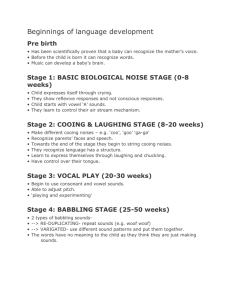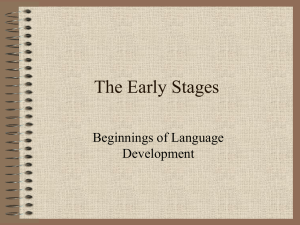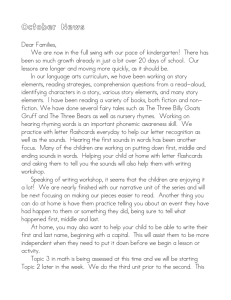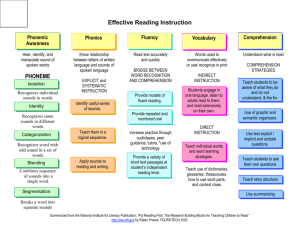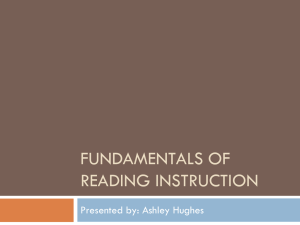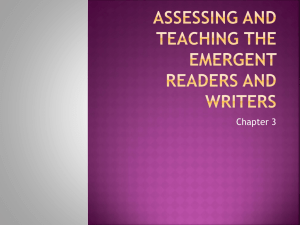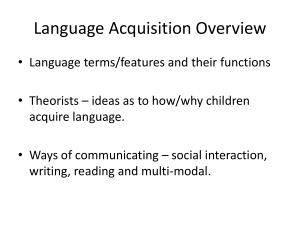Let’s take a look at kindergarten literacy development!
advertisement
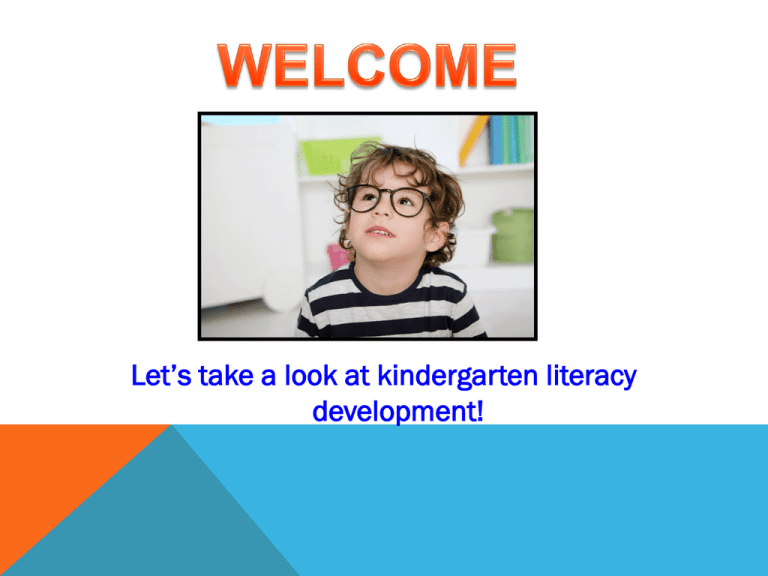
Let’s take a look at kindergarten literacy development! Wake up and listen! Learning begins with listening! Before a child can speak, they are already attaching meanings to sounds through listening i.e. mom’s voice, dad’s voice, scream, laughter VOCAL PLAY LEADS TO SPEECH SOUND FORMATION Vocal play (i.e. cooing, “oooo” “aaaa” “mmm” Babbling (i.e. babada, mamababa) Word approximations (i.e. dada!) • GRADUALLY SPEECH SOUNDS EMERGE • TO WHICH PARENTS ATTACH MEANING • AND REINFORCE WITH THEIR CHILD THE JOURNEY BEGAN….. Early Development 0-6 mo. Cooing 6-10 mo. Babbling 12-18 mo. First words Comprehension BEFORE Production! 8-12 mo. can understand almost 50 words! Before children come to school, they begin to hear that some words rhyme, can start with the same letter, can be short of long i.e. nursery rhymes, songs PRACTICE PRACTICE PRACTICE THE CHILD LEARNS TO ASSOCIATE THE SOUND AND MEANING • FIRST APPROXIMATIONS DA -DA • THEN REFINES SOUNDS - DADDY • EXPANSION CONTINUES INTO PHRASES “SEE DADDY” • AND THEN SENTENCES “I SEE DADDY!” **Vocabulary development: children develop the concept of a word prior to seeing it in print! WHAT DOES THIS HAVE TO DO WITH READING ? EVERYTHING ! Reading is… using letter and sound clues to decipher words to gain meaning from print. FIVE ESSENTIAL ELEMENTS OF READING 1. Phonemic Awareness 2. Word Recognition 3. Vocabulary Development 4. Comprehension 5. Fluency PHONEMIC AWARENESS Hearing, understanding and manipulating the sounds of our language • Individual sounds are combined to form words. • Words combine to form sentences. WORD RECOGNITION The ability to recognize a set of letters as a specific word • Sight word: Words automatically recognized (High Frequency Word) the come you •Word recognized through decoding… Matching the sound to letters and blending them together. (Word Families) cat hat bat VOCABULARY Attaching meaning to specific words Tier one and tier two words Estatic Happy Glad Cheerful COMPREHENSION Attaching meaning to a printed passage • Readers use strategies (plans) to understand and remember what they read • Read Aloud FLUENCY Reading at a reasonable pace with accuracy and expression • Repeated reading of the same text • Predictable books THE CONNECTION BETWEEN READING AND WRITING… KIDWRITING An approach to teaching developmentally appropriate writing in a supportive environment 1. Teachers model skills. 2. Students draw pictures then write about them. 3. Adults help students use phonetic clues to write words and sentences. EXAMPLE OF KIDWRITING: I put pickles in my pot. HOW DO I HELP MY CHILD ? IT’S REALLY EASY!! DO……….. SHARE YOUR LOVE OF READING TALK ABOUT THE BOOKS YOU AND YOUR CHILD READ MAKE LEARNING FUN TURN FUN INTO LEARNING EXPLORE BE A GOOD READING AND SPEAKING MODEL KEEP READING TO YOUR CHILDREN THE BEST TOOL.. YOU AND YOUR CHILD INTERACTING WITH PRINT

